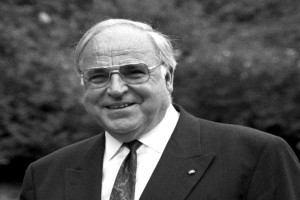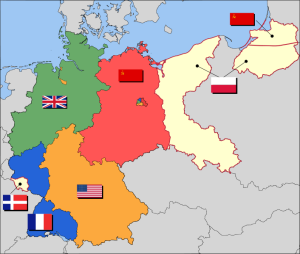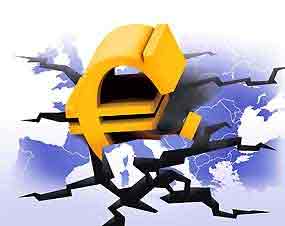nsnbc : Former German Chancellor Helmut Kohl has died at his home in Ludwigshaven, on Friday, at the age of 87. Kohl will mainly be remembered for the accession of East Germany (GDR) into the Federal Republic of Germany (BRD) and for making the for him difficult decision to swap the D-Mark with the euro to satisfy “allied” demands about the so-called reunification.
 Helmut Kohl served as German Chancellor between 1982 and 1998. His role in the so-called reunification of Germany earned him the public image as “the Chancellor of Reunification”.
Helmut Kohl served as German Chancellor between 1982 and 1998. His role in the so-called reunification of Germany earned him the public image as “the Chancellor of Reunification”.
Under extreme pressure, Kohl, in 1989, negotiated with leaders from the United States, the Soviet Union, the United Kingdom and France, to bring about the so-called reunification of the Soviet-occupied German Democratic Republic and the “Allied” occupied Federal Republic of Germany (BRD).
Although he rarely spoke about it in public, many who have had the privilege to talk with him in confidential talks, will be able to recall that Kohl was acutely aware of the fact that the “reunification” was a misnomer and that Germany did not regain its sovereignty by signing the so-called 2+4 treaty either.
Like many of his Christian Democratic Union and Christian Social Union party fellows, Kohl was aware that neither the GDR nor the BRD could represent the German Empire that had not ceased to exist at the end of World War II but had become “incapable of representing itself”.

Post-WW II German occupation borders and territories. Areas in beige indicate territories east of the Oder-Neisse line that were attached to Poland and the USSR. The Saar Protectorate, on the left hand side of the map, is also shown in beige. Berlin is the multinational area shown within the red Soviet zone. (source: Wikipedia)
Kohl was, like CSU colleague Theo Waigel, who was speaking more openly about the fact, aware that the 1989 “reunification” was a partial reunification and that no international law exists that would support claims that the German Empire lost its territorial sovereignty over areas that have since been incorporates in Poland. That, even though the BRD signed the 2+4 treaty and accepted the territorial status quo.
Helmut Kohl would also become known as the Chancellor of European Integration and for his contribution to the single currency market in Europe.
Historians will surely, at one time or the other, have to remedy misrepresentations in media and reconstruct a history that is more compatible with the actual evidence.
Kohl was, indeed, a convinced “European”. Kohl was, as many others were and are today, acutely aware that the deadly rivalry between Europe’s primary powers such as Britain, France and Germany had to end if Europe wanted to avoid a third global conflagration that would be unwinnable for any of the involved and spell the end of Europe – period.
Kohl’s and many other German Chancellor’s Europe policy was, however, also informed by Germany’s lack of sovereignty after WWII, and by Germany’s role as economic and by extension as political primus motor of the EU, to assert the influence a major central European (sovereign) power should have in Europe as well as globally.
With the 2+4 treaty not being a peace treaty, with Germany being “captured” by the “Allies” until it gives itself a new Constitution, and with the fiver permanent UN Security Council members refusing to remove the so-called enemy state clause from the UN Charter, it is not difficult for any German Chancellor to be “a convinced European” who uses the EU to endow Germany with “some degree of sovereignty”.
 Kohl’s leading role in introducing the European single currency market has also been widely misrepresented in German and international media. In his autobiography, Kohl would refer to his decision to abandon the German Mark (D-Mark) in exchange for the Euro as one of his and Germany’s “darkest hours”.
Kohl’s leading role in introducing the European single currency market has also been widely misrepresented in German and international media. In his autobiography, Kohl would refer to his decision to abandon the German Mark (D-Mark) in exchange for the Euro as one of his and Germany’s “darkest hours”.
Kohl described in great detail, how France made Germany’s accession to the Euro a precondition for the so-called “reunification”.
As a leader for Christian Democratic Union (CDU), Kohl was seen as the mentor for Chancellor Angela Merkel. In 2002, Kohl resigned from lower house of the parliament Bundestag and officially left politics.
He began fighting with illness after a fall and a head injury in 2008, since then he had to sit on a wheelchair and could barely speak. Kohl received a intestine surgery in 2015 since then his condition gradually worsened.
CH/L – nsnbc 17.06.2017
Source Article from https://nsnbc.me/2017/06/17/former-german-chancellor-helmut-kohl-has-died-the-misrepresented-german-european/
Related posts:
Views: 1
 RSS Feed
RSS Feed

















 June 17th, 2017
June 17th, 2017  Awake Goy
Awake Goy 










 Posted in
Posted in  Tags:
Tags: 
















